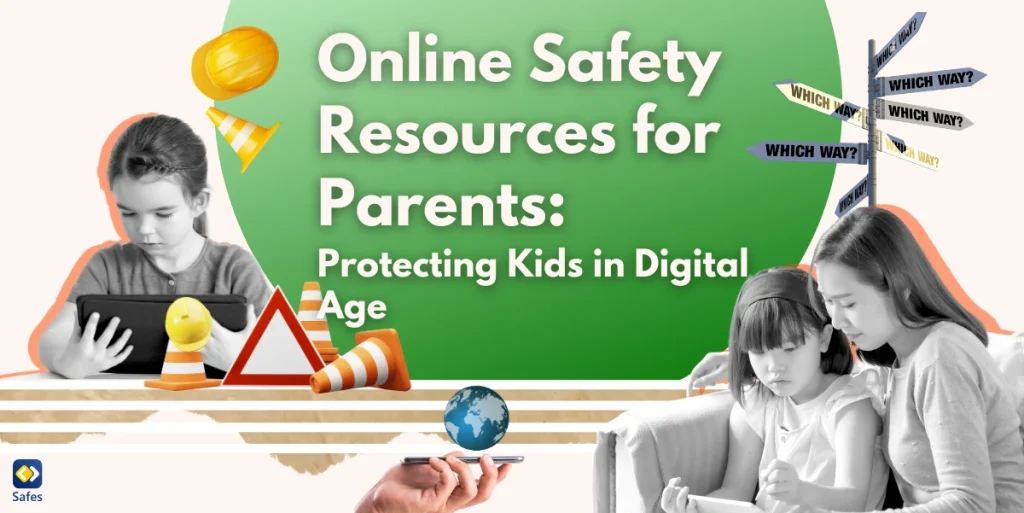We have all been there, you need to study but you can’t seem to focus. You try out everything and read every book and website that might help you in the slightest bit to concentrate. As a result, hours are lost to find the right method to study but you still didn’t study one single word that you had to.
Download and Start Your Free Trial of the Safes Parental Control App
Now that you’re a parent, your kid might struggle with the same thing. There can be plenty of reasons why your child gets distracted while studying. You can think about distractions, such as entertainment sources or having no interest in the subject.
On a more serious note, there can also be more important reasons why your child has trouble focusing. If you want to help your child, keep on reading to see what to do when your child can’t focus on studying.
Why Your Child Can’t Concentrate on Studying
There can be a lot of different causes why your child can’t concentrate on studying. Besides things like having low energy or having to study a boring subject, it can be possible that your child needs expert help. Please keep in mind that this blog does not replace a doctor’s diagnosis. When you want to take any form of action, please contact a physician first.
ADHD
If your child can’t focus on studying, ADHD may be the cause. Children diagnosed with Attention Deficit Hyperactivity Disorder (ADHD) are neurodivergent, which indicates that their neurological system is not neurotypical like their classmates. The child’s ability to concentrate and maintain consistent mental focus is compromised. They may have difficulty blocking out sources of distraction, either internal or external.
Children with ADHD symptoms may have difficulty controlling their impulses and hyperactive tendencies. This causes new distractions on its own. If your child is diagnosed with ADHD, it is best to speak to a mental health professional on how to help your child when they can’t focus on studying.
Learning Difficulties
Learning difficulties like dyslexia or auditory processing problems can also affect the ability to focus on studies without getting distracted. Certain tasks may take longer to complete. To hide or prevent their embarrassment, they can engage in unrelated behaviors. These kids can give the impression that they are not trying to concentrate, but it is not intentional. By helping them with their learning difficulties, they can learn how to handle them and anticipate needing more time to focus and study.
Inappropriate Lesson Level
Our education system is mostly mass-teaching. This causes a lot of children not to be at the level they should be at school. When a lesson is too difficult, it can be hard for a child to keep up. That can result in overwhelming and overstimulating lessons.
On the other hand, if the study material is easier than the child’s learning potential, it won’t be challenging enough for the child to be interested. If this is the case, it is best to contact your child’s teacher and have a conversation on the best way to improve your child’s study quality.

Solutions to Help Your Child Focus
Keeping the above-mentioned causes in mind, let’s look at 11 things you can do when your child can’t focus on studying.
- Understand Energy Levels
Everyone has a different productivity window for studying. Some might prefer studying in the mornings, while others are more effective in the evening. Understanding your child’s energy patterns is key, this can prevent a lot of frustrating arguments. Instead of fighting their preference, you can help them create an appropriate study schedule and take them one step closer to a successful study session.
- Keep Distractions to a Minimum
Studying circumstances might not always be optimal, especially if you live in a noisy household. In order to study, your child needs to be able to concentrate in the room. For your child to be able to focus on their studies without getting distracted, it is necessary to decrease distracting stimuli. The fewer distractions, the higher the chance of your child being able to concentrate and understand what they are trying to learn. Keep in mind that studying in a completely silent room might not be beneficial either.
With the increase in the availability of social media on smartphones, this can be a distraction too. Being entertained on the internet seems like a better pastime compared to studying. It might be good to put their phone on airplane mode or keep it out of sight when they are studying. If they need their phone to study, you can consider using a parental controls app to block out distractions.
- Parental Controls
You might want to have more control over the available sources that your child can use while studying. In that case, the Safes’ parental controls might be a good option. Safes offers a lot of features to filter out distractive content and make the digital world safer for children. Some of Safes’ features are:
- Application blocking: Deny access to specific applications based on the parent’s preferences.
- Website content filtering: Blocks out inappropriate websites. Parents can also select specific content categories.
- Smart scheduling: Allows parents to plan their child’s whole timetable and block any activity that overlaps with other events.
If you are interested, feel free to download the Safes app or use the web panel to try the free trial.
- Create a Routine
Creating a routine can help a child in the long run. Developing an effective routine can help reduce stress and eventually lead to better mental health and less anxiety. Research shows that to bring consistency and comfort to a child’s life, routines can make a great contribution.
When your child is prepared to study at a certain time of the day, the added stress of that moment decreases. This can result in a better studying session. If you have more than one child, it can be especially good to determine a collective studying time, so they can motivate each other to stay on track as well.
- Breaking Tasks into Chunks
As children get older, they get more assignments for school. This can cause a lot of pressure and distress. When your child can’t focus on studying because of task overload, it can be helpful to break the different tasks into manageable chunks. By having to think about one task at a time, it gets less overwhelming, and effective studying time can be achieved.
- Set a Timer
Everyone has different attention spans; it is well-known that children have much shorter attention spans compared to adults. A child’s maximum attention span is approximately two to three times their age. An eight-year-old would have an attention span of twenty-four minutes at best. You can use a personalized timer to set the productive studying time and plan breaks in between.
A specific way of using a timer is the Pomodoro technique, which handles 25 or 30 minutes of effective studying and a 5-minute break in between each timer. After four Pomodoros, you can take a break for 15 minutes. There are a lot of online tools that have the timers pre-planned.

- Try Mindfulness
Mindfulness is a very effective tool for kids to increase focus, help them get good grades, and improve overall well-being. During mindfulness, children practice paying attention and improving focus.
There are a lot of mindfulness activities like deep breaths that can help you introduce mindfulness to your child. It is best to start by being more mindful of daily tasks. Later, you can do more advanced exercises.
- Difference Between Places
A reason why your child might get distracted is that they work and relax in the same environment. If your child or teen has a habit of studying in bed or on the couch, it might be difficult for them to stay focused on their studies.
Try to set up a different space for your child to study, so their study and relaxation spaces are separated. If you only have their bedroom to work with, you can think about partitions and creating a corner. Try to help their brain adapt to two separate spaces: a workspace and a relaxation space.
- Everything at Hand
It can be very helpful to have everything your child needs ready when they start a study session. Besides the essentials like pen and paper, it can be good to think about a tiny snack or drink to keep them hydrated and give them a little motivation boost. When everything is ready for a study session, they won’t have to think about needing something halfway or to stand up and burst their concentration bubble.
- Headphones Can Help
Noise-canceling headphones can help to muffle surrounding sounds out. This can help to decrease the background noise in the household and help your child concentrate better. If your child is not that much into silence, they can choose to listen to music while they are studying. Think about instrumental music, white noise, or brown noise. White and brown noise has been proven to enhance concentration ability.
- Be Open to What Works
Things might not always go as planned. Be open to communicating with your child and come to a solution on how to study when your child can’t focus on their studies. Don’t be afraid of trying what your child suggests that is comfortable for them. Together, you can come to a solution on what works best for your child to focus on their studies without getting distracted.
Your Child’s Online Safety Starts Here
Every parent today needs a solution to manage screen time and keep their child safe online.
Without the right tools, digital risks and excessive screen time can impact children's well-being. Safes helps parents set healthy boundaries, monitor activity, and protect kids from online dangers—all with an easy-to-use app.
Take control of your child’s digital world. Learn more about Safes or download the app to start your free trial today!




